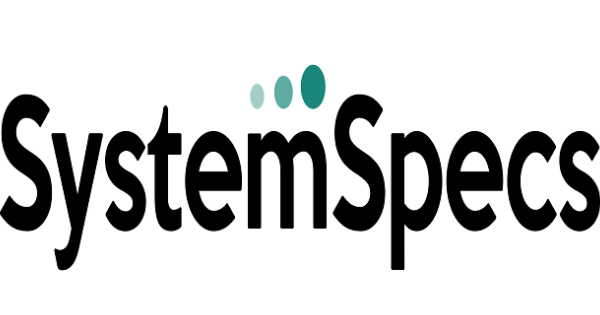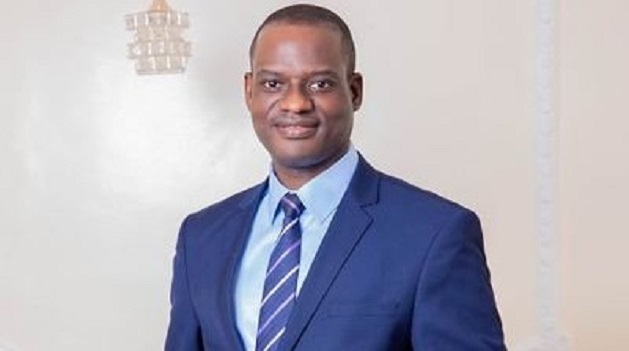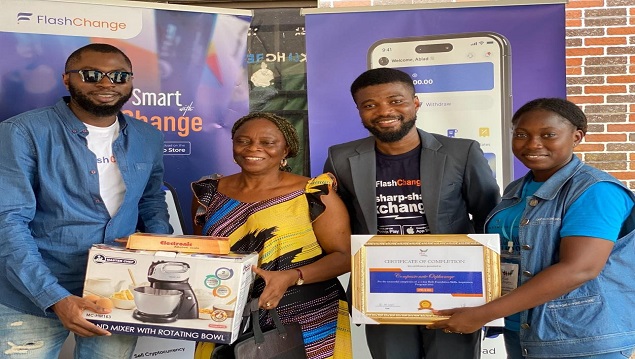General News
SystemSpecs Makes Case for Broadband Penetration to Deepen Financial Inclusion

SystemSpecs, has supported calls by stakeholders in Nigeria’s business ecosystem for increased broadband penetration to deepen financial inclusion as a means of social and economic transformation in the country.

This was affirmed recently by ‘Deremi Atanda, SystemSpecs’ executive director, when he served as a speaker at the annual Bullion Lecture, organised by the Centre for Financial Journalism (CFJ), which held both virtually and physically in Lagos.
According to a 2018 World Bank report, financial inclusion means that individuals and businesses have access to useful and affordable financial products and services that meet their needs, including payments, savings and credit in a responsible and sustainable way.
A Boston Consulting Group (BCG) report had stated that a one per cent increase in financial inclusion increases real Gross Domestic Product (GDP) per capita by 3.6 per cent.
“We must continue to focus on those things we regard as national issues. If we say financial inclusion is an opportunity to bring the economically disadvantaged persons into the economic network that can improve their lives, then it should be at the forefront of all we do,” Atanda said.
He said although the Central bank of Nigeria, the Nigerian Communications Commission and other relevant government agencies have done a lot in improving financial inclusion, there was still a lot to be done.
“How do we leverage technology to make sure that disadvantaged Nigerians can have their quality of lives improved and a sense of belonging as Nigerians? What are the strategies to ensure that the average Nigerian can be economically empowered?” he asked.
Strongly recommending that stakeholders begin to more actively consider the country’s burgeoning fintech community as a key contributor to the attainment of the desired financial inclusion goals, he said the digital economy is an enabler of social transformation and economic empowerment.
Further in his comments, Atanda analysed the interception between broadband penetration and financial inclusion as well as the consequence on socio-economic improvement, saying “As we deepen the collaboration between stakeholders within and outside government, we need to know what has worked what is not working and what needs to be done differently.”
“I think there is still a lot more to be done. The engagement of regulators and non-governmental stakeholders should be very clear and be continuously progressive,” Atanda added.
According to Professor Umar Danbatta, executive vice chairman of the Nigerian Communications Commission (NCC) and keynote speaker at the event, in Nigeria, only 58.5 per cent of the adult population were financially included, participating in the formal economy as of 2016. Nigeria had a target of 80 percent financial inclusion by the end of 2020.
The NCC boss highlighted a number of initiatives being implemented by the commission to deepen the frontiers of digital access to financial inclusion. These include pervasive broadband drive, unstructured supplementary service data (USSD) integration, SIM registration and subscriber database audit, new numbering plan, MoU with the Central bank of Nigeria (CBN) on mobile money, collaboration with other institutions, and addressing risks associated with digital financial services.
Another speaker at the event, Chizor Malize, CEO of the Financial Institutions Training Centre (FITC), spoke about the importance of building digital infrastructure in order to grow the economy. She analysed how technology and telecommunications infrastructure have deepened development in the society.
“The importance of digital connectivity is seen in areas where government, individuals, organisations, communities and other stakeholders are connected in a way that engagement and interaction are easier,” Malize said.
General News
FG to Introduce New Tax Credit Scheme to Replace Pioneer Status Incentive

As part of Nigeria’s ongoing tax reform efforts, the federal government is proposing a new investment-driven incentive framework aimed at addressing long-standing inefficiencies in the current Pioneer Status Incentive (PSI).

The new scheme, known as the Economic Development Incentive (EDI), is designed to stimulate real economic activity by tying tax relief directly to verifiable investments.
This was the focus of a keynote address delivered by Taiwo Oyedele, Chairman of the Presidential Committee on Fiscal Policy and Tax Reforms, at BusinessDay’s Policy Intervention Series held on April 22 in Lagos.
According to Oyedele, a close review of the Pioneer Status Incentive revealed structural flaws that have undermined its effectiveness. “Once granted Pioneer Status,” he said, “companies may import goods classified as ‘pioneer products’ tax-free, effectively allowing them to operate without tax obligations—even with minimal value addition to the economy.”
He further noted that while the PSI was initially designed to encourage investment, it created loopholes and ambiguities. For example, businesses often benefit from extended tax relief even after the designated holiday period ends.
“The assets used during the Pioneer period are essentially frozen in time,” Oyedele explained. “They’re treated as if acquired after the incentive ends—meaning companies only start claiming deductions once the holiday period is over. This creates long-term tax advantages that go well beyond the policy’s original intent.”
He also pointed out that the PSI makes it difficult for the government to quantify revenue forgone and for investors to clearly assess the value of the incentive—undermining transparency on both sides.
The Economic Development Incentive
The proposed Economic Development Incentive is a departure from the one-size-fits-all model. Instead, it’s structured around priority sectors—primarily manufacturing, followed by services and infrastructure—that have strong multiplier effects on the economy.
Another key design feature is the introduction of minimum investment thresholds to ensure only scalable and impactful projects qualify. For instance, companies operating in capital-intensive sectors like utilities would need to invest at least N200 billion to be eligible for the tax credit.
“The EDI is about real impact,” Oyedele said. “It’s time-bound, sector-targeted, and tied to actual capital deployment—not just approval on paper.”
Unlike blanket tax holidays, the EDI grants companies a 5 percent annual tax credit over five years—totaling 25 percent of the value of their qualifying investment. Importantly, this is in addition to existing capital allowances, making the scheme particularly attractive to long-term investors.
Crucially, approval under the scheme does not mean the investment has already been made. It only confirms that the company has a verified plan. The incentive kicks in only after capital is actually deployed, and all investments are subject to inspection by the Industrial Inspectorate Division.
Oyedele broke down how the system works using practical examples:
If a company invests N10 billion in Year 1, it earns a N500 million tax credit each year for five years. If an additional N5 billion is invested in Year 2, that new investment begins its own five-year 5 percent cycle—N250 million annually until Year 6.
If the company continues investing progressively, each round of investment starts a new five-year cycle of tax credits, potentially extending the benefit period up to 10 years.
For instance, if a business has a N15 million tax liability in a given year and applies N25 million in tax credits, its liability is wiped out entirely, with the N10 million balance rolled over to subsequent years.
However, there’s a catch: if a company fails to follow through on its investment plan or halts capital deployment, unused credits are forfeited. This accountability mechanism ensures that only consistent and credible investments are rewarded.
General News
FlashChange Partners Ruth Foundation to Empower Vulnerable Children in Alimosho with Skill Acquisition

In an inspiring initiative to uplift the next generation, FlashChange and Ruth Foundation have successfully implemented the “Orphanage Skill Acquisition Assembly 2.0 program,” a skills empowerment program for vulnerable children in Alimosho, Local Government Area of Lagos state.

The five-day programme, which began on Monday, April 14, was created to equip vulnerable children aged 4 to 18 years with essential life skills such as financial literacy, fashion design, photography, creative arts, cooking, and leadership development
Speaking at the closing ceremony of this year’s edition of the programme, the Chief Operating Officer, Flashchange, Olamide Ajibola said, “We are delighted to be part of this life-changing initiative.
“At FlashChange, we believe that children are the heartbeat of every community, by investing in their development today, we are not just shaping the future of individuals but nurturing future leaders, creators, and change-makers that would make a positive contribution to the growth and development of the society in the near future.”
“Initiatives of this nature gladdens our heart and we are open and willing to participate in them at any time. In the coming months, we hope to do more in that area as our own little way of improving society. This is in line with our CSR pillars, which include human capital development.”
Ajibola appreciated the benefitting children for accepting to be part of the life changing training which has the capacity to catapult them to a brighter future. The facilitators were also commended for impacting the children with the skills and knowledge to help shape their lives.
The founder Ruth Foundation, Itunuoluwa Ruth Da-Silva, in her remarks, expressed the foundation’s deepest appreciation to partnering organizations like FlashChange for believing in the vision and throwing their full weight behind it.
She said, “It will interest you to know that 153 vulnerable children benefitted from the Orphanage Skill Acquisition Assembly 2.0 programme and the training ran simultaneously at Compassionate Orphanage home; Precious Pearl Orphanage; Little Saints Orphanage and House of Mercy Orphanage respectively. Providing the children access to knowledge and skills early in life to create a ripple effect that can transform the entire community.”
The Chief Marketing Officer, FlashChange Jesujoba Ojelabi commended Ruth foundation for the initiative and urged the children to take the skills learnt seriously, as it has the capacity to change their lives for good.
He said, “As a company, we would be proud to lend our support to the foundation whenever we are called upon to do so in the future. My candid advice to you children would be this, to be great ambassadors of this initiative, you need to continuously put to practice the skills and knowledge you have acquired from the programme. We are indeed proud of you all and the success stories recorded so far.”
To support the continuous development of the children the following items were donated; electric sewing machine, cake mixer; packs of Yeye yarn, packs of pins, some stitch markers, scissors, measuring scale, make-up kit box filled with make-up tools among several others.
FlashChange and Ruth Foundation therefore urge community leaders, government organizations, private sector partners, and stakeholders to support programmes of this nature aimed at equipping children with the skills they need to thrive in a world that is evolving quickly.
General News
EFCC Clarifies SCUML Certificate Misuse amid CBEX Ponzi Scheme Scandal

Economic and Financial Crimes Commission, EFCC, has dismissed the claims that the defunct digital asset trading platform, CBEX, was registered with its Special Control Unit against Money Laundering, SCUML.

However, EFCC stated that ST Technologies and not CBEX registered with SCUML, saying that the certificate didn’t imply clearance by the Commission.
The clarification comes after Lesley Kessy Oviritsa, one of the victims of the CBEX Ponzi Scheme said she fell prey to CBEX after seeing and verifying its CAC and SCUML Certificate.
Oviritsa claimed they had no reason to suspect foul play, especially since they claimed their SEC certificate would be ready by May 2025.
Nigeria CommunicationsWeek reported how CBEX swept over N1.3 trillion from their investors’ accounts.
In a post on its official handle on X on Monday, EFCC said the Commission is not a clearing house or regulatory authority of online businesses.
The post read: “SCUML Certificate Is Not CLEARANCE BY EFCC.
“ST Technologies (not CBEX) registered with the Special Control Unit against Money Laundering, SCUML in line with Section 17 of the Money Laundering, (Prevention & Prohibition) Act, 2022.
“Registration is a statutory requirement for all Designated Non-Financial Businesses and Professions, DNFBPs, in Nigeria in consonance with Nigeria’s Anti-Money Laundering/ Control of Financing Terrorism, AML/CFT regime.
“The EFCC is not a clearing house or regulatory authority of online businesses.
“But financial fraud of any kind is the remit of the Commission, and it is committed to ensuring justice for victims of the CBEX scam.”

 Telecom2 days ago
Telecom2 days agoMTN Nigeria Takes Broadband Services to the Next Level with FibreX Launch

 News2 days ago
News2 days agoSERAP Files Lawsuit Against NBC Over Ban on Eedris Abdulkareem’s Protest Song Tell Your Papa

 Telecom1 day ago
Telecom1 day agoDigital Transformation Remains Africa’s Gateway to Economic Advancement – Adumike

 Telecom1 day ago
Telecom1 day agoPAFON 2.0: Experts Discuss Pathways to Boost Financial Inclusion in Nigeria

 E-Financial1 day ago
E-Financial1 day agoCBN, NGX Group Defend Economic Reforms at Nasdaq

 General News1 day ago
General News1 day agoEFCC Clarifies SCUML Certificate Misuse amid CBEX Ponzi Scheme Scandal

 E-Financial2 days ago
E-Financial2 days agoFCMB Group Redefines Corporate Storytelling with The Power Of The Group TVC

 General News1 day ago
General News1 day agoFlashChange Partners Ruth Foundation to Empower Vulnerable Children in Alimosho with Skill Acquisition



























